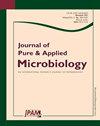Comorbidities and their Impact on COVID-19 Severity
IF 0.6
Q4 MICROBIOLOGY
引用次数: 0
Abstract
The current COVID-19 pandemic is caused by the novel SARS-CoV-2 coronavirus strain. Although SARS-CoV-2 infection can affect everyone, the kind and degree of infection and sickness vary widely between individuals and populations. It has been crucial since reported disease loads and case fatality rates vary greatly among countries. However, there are still uncertainties about the severity of the illness in certain people and, in other cases, the aetiology of a more severe illness. Various chronic conditions, such as diabetes, cardiovascular diseases, respiratory ailments, and immunodeficiency disorders, have been identified as significant risk factors for COVID-19. These comorbidities not only increase the susceptibility to contracting the virus but also exacerbate the severity of symptoms and the likelihood of adverse outcomes, including hospitalization, intensive care unit admission, and mortality. The objective of this article is to point out the proliferation of COVID-19 in relation to different diseases affecting the clinical outcome of COVID-19. The study included 1500 patients with various diseases such as HCV, HBV, kidney disease, heart disease, asthma, T.B., arthritis, smokers, and vaccinated or unvaccinated. Results showed that 22% of diabetic patients, 40% of heart patients, 40% of asthma patients, 26% of kidney patients, 25% of T.B patients, and 41% of smokers had high corona positive. Coronavirus positivity was found in 34% of vaccinated patients and 72% of non-vaccinated patients, with an overall calculated p-value of 0.0001 by ANOVA statistical analysis. The overall outcome of the results showed that the severity of Corona disease increased in relation to different diseases.合并症及其对 COVID-19 严重程度的影响
当前的COVID-19大流行是由新型SARS-CoV-2冠状病毒株引起的。虽然SARS-CoV-2感染可以影响每个人,但感染和疾病的种类和程度在个人和人群之间差异很大。这一点至关重要,因为各国报告的疾病负荷和病死率差异很大。然而,对于某些人的疾病严重程度,以及在其他情况下更严重疾病的病因,仍然存在不确定性。各种慢性疾病,如糖尿病、心血管疾病、呼吸系统疾病和免疫缺陷疾病,已被确定为COVID-19的重要危险因素。这些合并症不仅增加了感染病毒的易感性,而且加剧了症状的严重程度和不良后果的可能性,包括住院、入住重症监护病房和死亡。本文的目的是指出COVID-19的增殖与影响COVID-19临床结局的不同疾病的关系。该研究包括1500名患有各种疾病的患者,如HCV、HBV、肾病、心脏病、哮喘、结核病、关节炎、吸烟者、接种疫苗或未接种疫苗的患者。结果显示,22%的糖尿病患者、40%的心脏病患者、40%的哮喘患者、26%的肾病患者、25%的结核患者和41%的吸烟者呈高冠阳性。冠状病毒阳性检出率为34%,未接种疫苗的检出率为72%,方差分析计算的总p值为0.0001。结果表明,冠状病毒病的严重程度随疾病的不同而增加。
本文章由计算机程序翻译,如有差异,请以英文原文为准。
求助全文
约1分钟内获得全文
求助全文
来源期刊

Journal of Pure and Applied Microbiology
BIOTECHNOLOGY & APPLIED MICROBIOLOGY-MICROBIOLOGY
CiteScore
2.00
自引率
0.00%
发文量
266
审稿时长
11 months
期刊介绍:
Journal of Pure and Applied Microbiology (JPAM) is a peer-reviewed, open access international journal of microbiology aims to advance and disseminate research among scientists, academics, clinicians and microbiologists around the world. JPAM publishes high-quality research in all aspects of microbiology in both online and print form on quarterly basis.
 求助内容:
求助内容: 应助结果提醒方式:
应助结果提醒方式:


